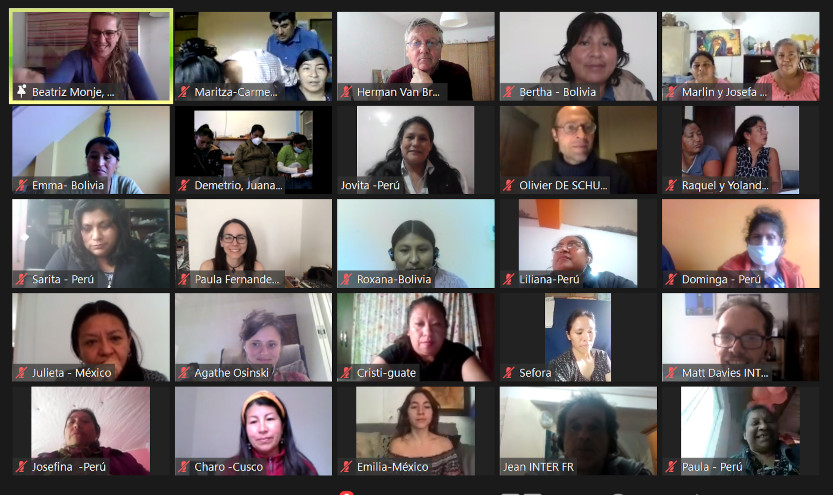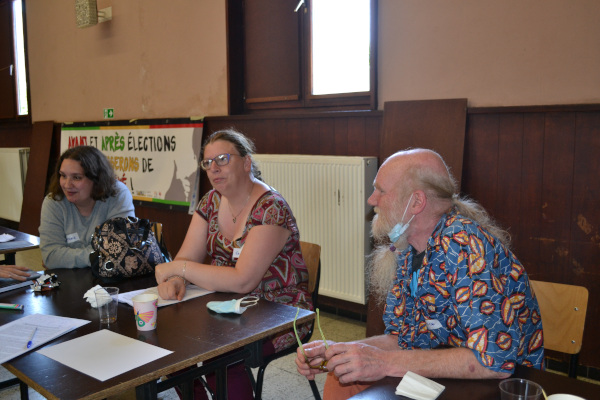Understanding Persistent Poverty
Uniting for a better future
“We know that it’s very hard living in poverty. We carry–we drag behind us–all this suffering, all these chains.”
(Emma, Peru)
“Living in poverty is a vicious circle that is hard to break out of. Every day we fight for ourselves and for our children. But how can we do it all by ourselves? How can we escape this vicious circle if people never listen to us or pay attention to what we’re saying?”
(Astrid, Luxembourg)
First-hand experiences essential to understanding poverty
In 2020, the United Nations Special Rapporteur on extreme poverty and human rights, Olivier De Schutter, approached the International Movement ATD Fourth World. He asked if Fourth World Activists would be willing to talk about their own experiences of living in poverty for an official United Nations report he was working on. Understanding persistent poverty was crucial for the report, which was published in six languages and presented to the UN General Assembly in New York last October.
In developing the report, the Special Rapporteur pioneered a new way of working on a document like this. Through a process of “participatory dialogues,” people living in extreme poverty described what they know from their own first-hand experiences. Understanding persistent poverty was the goal of these dialogues.
The Special Rapporteur is convinced that learning from people’s first-hand experiences is essential to really understanding the persistence of poverty.
Participatory dialogues
The participatory dialogues took place with Fourth World activists and ATD teams from Belgium, the Democratic Republic of Congo, several Latin American countries, and Luxembourg. Two multi-hour video-conferences took place with Latin American countries and the Democratic Republic of Congo. In addition, there were two full day in-person meetings with participants from Belgium and Luxembourg, focusing on understanding persistent poverty.
While these dialogues were taking place, the Special Rapporteur asked university researchers to comment for the report. In addition, he invited ATD Fourth World for input on some additional points the researchers hadn’t addressed.

Inter-generational transmission or persistence?
In its comments, ATD Fourth World called into question the term “inter-generational transmission” of poverty, preferring “inter-generational persistence”. The first expression, they said, could suggest that parents are responsible for passing poverty on to their children.
For ATD, the notion of persistence reflects reality more accurately. In fact, many people experience poverty as a trap composed of structural, institutional, and social barriers, even sometimes of relationships. Understanding persistent poverty involves recognizing these barriers. Discussed at length, the term “persistence” became a central theme of the final report.
Multiple factors contribute to “persistence”

The official UN report addresses several themes including health, housing, education, and work, highlighting the importance of investing in early childhood and combating discrimination. Understanding persistent poverty involves examining these areas thoroughly.
Other issues emphasized in the participatory dialogues included:
- lack of recognition both for people in poverty themselves and for what they know and understand;
- frequent refusal to allow people in poverty to take part in many areas of life.
Although their experiences and perspective are essential to understanding poverty better, others rarely ask people in extreme poverty to contribute to solutions.
“Nobody–anywhere–recognizes what we actually can do. We don’t have degrees. We don’t have anything! So what can we do? How can we make other people see what we are capable of, so they pay attention to every child’s ability to learn and to be creative? School should be where people see to all this.”
(Karine, Belgium)
“Society needs to change. It needs to allow people who live in the worst poverty to learn and develop their abilities.”
(Vivi, Guatemala)
Services and support structures
In addition, dialogue participants brought up the issue of services and other support structures, both state-run and private. Access to services is essential for people living precarious lives. At play here is not only access to material resources but also the question of relationships, respect, listening, and both individual and collective rights.
“We lose people we love because we can’t go see a doctor or get other medical attention. Having access to quality care is a luxury these days. You have to be really well-off to get treatment somewhere good. And that can really set us back a lot.”
(Janvier, Democratic Republic of Congo)
“When you go to support services, you feel they don’t understand you. Communication is hard. Sometimes you don’t even dare ask for help because you feel like nobody can help you – or even wants to.”
(Nicole, Luxembourg)
Discrimination
Discrimination—both structural and institutional—was a central theme in the dialogues.
“What people at the bottom say–the employees, the low-income workers–isn’t considered valuable. The guys at the top have always put us down; the decisions always come from on high.”
(Demetrio, Bolivia)
“For us, respect is listening to us, taking each person as they are. Whether they are sick, disabled, fat, thin, verbal or not, you take them as they are.”
(Nicole, Luxembourg)
Uniting for a better future
Dialogue participants asked what leverage or tools are available if people in poverty want to use their knowledge and experience to achieve wide-scale change. Understanding persistent poverty may offer insights into creating systemic change. Many suggested finding ways to come together as a group to share their expertise.
- “Right here in this group, we have a community. And that’s helpful when you want to approach the authorities. When a whole community speaks out, most authorities are scared. And then sometimes, we get some rights.”
(Janvier, Democratic Republic of Congo)
“When you’re talking to the professionals, then things change. If someone is too scared to talk to the professionals, they need someone else they can talk to about their problems. Often that’s the thing that’s missing. Two people need to agree to talk to each other, to meet up. Like a forum.”
(Nathalie, Belgium)
Olivier De Schutter and his team underlined the importance of this several times:
“One of you used this expression: ‘We are fighting for a better future’. The important thing in this phrase is the plural. By arriving together at a better understanding of the situation and the solutions, we can change the way things are done–by exercising our rights, using our power, and demanding that governments be held accountable.”
A summary accompanies the full report presented to the UN. Both specifically quote people who took part in the dialogues to highlight their contributions and encourage such input on the issue of extreme poverty in the future. These contributions are vital for understanding persistent poverty.
To read the report summary, click here
For the official report, click here
Watch video on socio-economic discrimination, “Don’t Say Where You Are From”, a conversation with Olivier De Schutter and people living in poverty.



